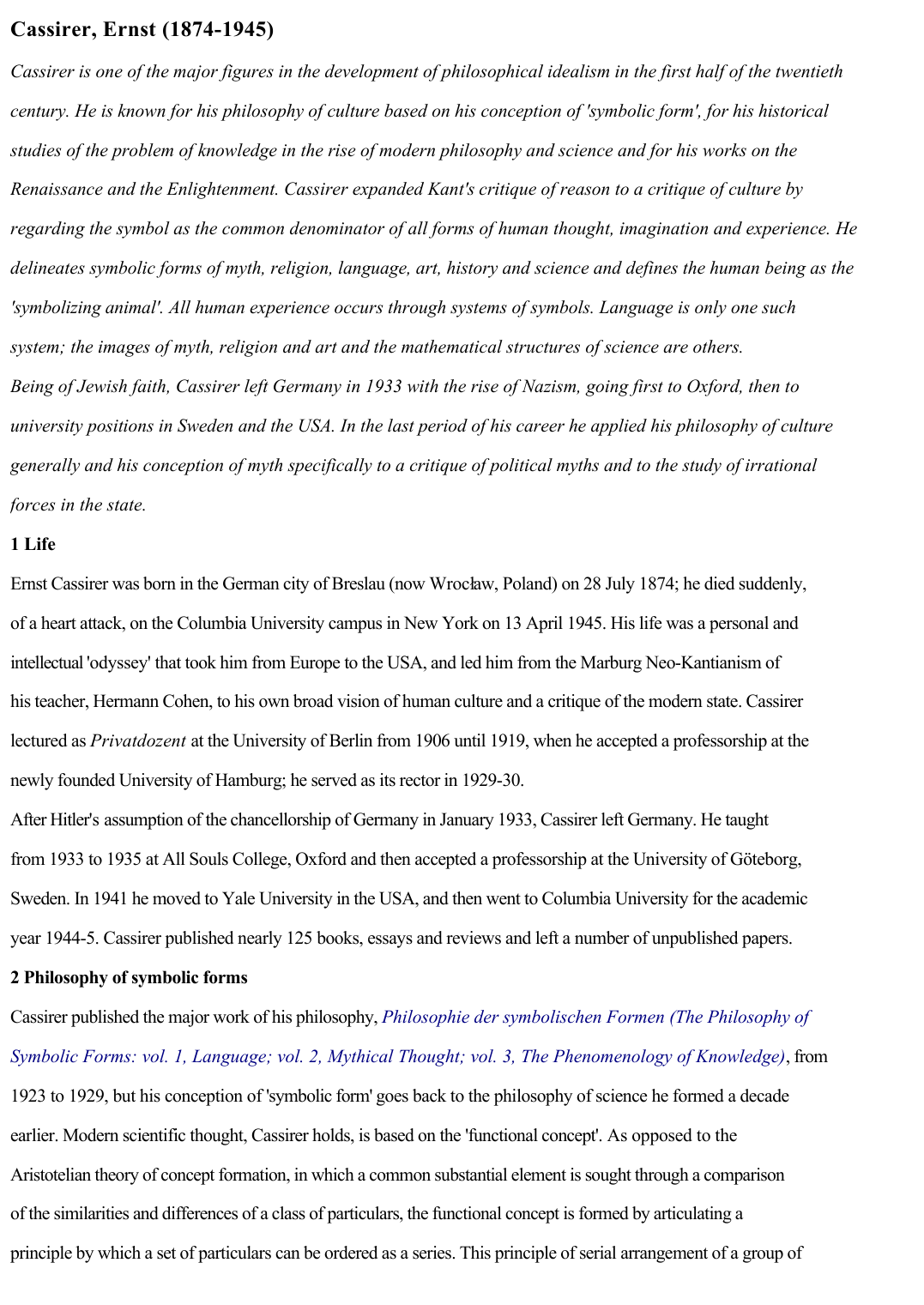Cassirer, Ernst
Publié le 16/05/2020

Extrait du document
«
Cassirer, Ernst (1874-1945)
Cassirer is one of the major figures in the development of philosophical idealism in the first half of the twentieth
century.
He is known for his philosophy of culture based on his conception of 'symbolic form' , for his historical
studies of the problem of knowledge in the rise of modern philosophy and science and for his works on the
Renaissance and the Enlightenment.
Cassirer expanded Kant 's critique of reason to a critique of culture by
regarding the symbol as the common denominator of all forms of human thought, imagination and experience.
He
delineates symbolic forms of myth, religion, language, art, history and science and defines the human being as the
'symbolizing animal' .
All human experience occurs through systems of symbols.
Language is only one such
system; the images of myth, religion and art and the mathematical structures of science are others.
Being of Jewish faith, Cassirer left Germany in 1933 with the rise of Nazism, going first to Oxford, then to
university positions in Sweden and the USA.
In the last period of his career he applied his philosophy of culture
generally and his conception of myth specifically to a critique of political myths and to the study of irrational
forces in the state.
1 Life
Ernst Cassirer was born in the German city of Breslau (now Wrocław , Poland) on 28 July 1874; he died suddenly,
of a heart attack, on the Columbia University campus in New York on 13 April 1945.
His life was a personal and
intellectual 'odyssey' that took him from Europe to the USA, and led him from the Marburg Neo-Kantianism of
his teacher, Hermann Cohen, to his own broad vision of human culture and a critique of the modern state.
Cassirer
lectured as Privatdozent at the University of Berlin from 1906 until 1919, when he accepted a professorship at the
newly founded University of Hamburg; he served as its rector in 1929-30.
After Hitler 's assumption of the chancellorship of Germany in January 1933, Cassirer left Germany.
He taught
from 1933 to 1935 at All Souls College, Oxford and then accepted a professorship at the University of Göteborg ,
Sweden.
In 1941 he moved to Yale University in the USA, and then went to Columbia University for the academic
year 1944-5.
Cassirer published nearly 125 books, essays and reviews and left a number of unpublished papers.
2 Philosophy of symbolic forms
Cassirer published the major work of his philosophy, Philosophie der symbolischen Formen (The Philosophy of
Symbolic Forms: vol.
1, Language; vol.
2, Mythical Thought; vol.
3, The Phenomenology of Knowledge) , from
1923 to 1929, but his conception of 'symbolic form' goes back to the philosophy of science he formed a decade
earlier.
Modern scientific thought, Cassirer holds, is based on the 'functional concept' .
As opposed to the
Aristotelian theory of concept formation, in which a common substantial element is sought through a comparison
of the similarities and differences of a class of particulars, the functional concept is formed by articulating a
principle by which a set of particulars can be ordered as a series.
This principle of serial arrangement of a group of.
»
↓↓↓ APERÇU DU DOCUMENT ↓↓↓


